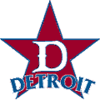Detroit Stars
| Detroit Stars 1919–1931 Detroit, Michigan | |||
| |||
| Leagues | |||
| |||
|
| |||
| Ballpark | |||
| |||
The Detroit Stars were an American baseball team in the Negro leagues and played at historic Mack Park. There were several incarnations of the Stars; the original Stars from 1919–1931, the second incarnation in 1933, the third version in 1937 and a last resurrection in the 1950s when the Negro leagues were more of a minor league.
Founding
Founded in 1919 by Tenny Blount with the help of Rube Foster, owner and manager of the Chicago American Giants, the Detroit Stars immediately established themselves as one of the most powerful teams in the West. Foster transferred several of his veteran players to the team, including player-manager Pete Hill and legendary catcher Bruce Petway. Left-hander John Donaldson, Frank Wickware, Dicta Johnson, and Cuban great José Méndez took up the pitching duties, and Texan Edgar Wesley was brought in to handle first base, a job he would hold for several years.
League play

The Stars became a charter member of the Negro National League (NNL) in 1920.[1] New outfielder Jimmie Lyons enjoyed a brilliant season at bat, and Detroit came in second with a 35-23 record. The next season Lyons was transferred to the American Giants, and the team slumped to 32-32 and fourth place. This would be their low point for some time. For the rest of their tenure in the NNL, the Stars were consistently good (finishing under .500 only twice), but not brilliant (finishing as high as second place only twice).
The mainstays of the Detroit Stars during the 1920s were Hall of Fame center fielder Turkey Stearnes, who ranks among the all-time Negro league leaders in nearly every batting category; Hall of Fame pitcher Andy Cooper, a workhorse southpaw; pitcher Bill Holland; and first baseman Wesley, who led the league in home runs twice and batting average once. Pete Hill left after the 1921 season. Bruce Petway took his place as manager until 1926, when Candy Jim Taylor briefly held the position. Bingo DeMoss, yet another Rube Foster protégé, took over in 1927, and finally led the team to its first postseason berth in 1930. The Stars won the second-half season title, only to lose the playoff series to the St. Louis Stars.
Decline, demise and reincarnates
After the collapse of the Negro National League at the end of 1931, the Stars disbanded.
Detroit Stars (II): In 1933 the team reappeared in the newly reformed Negro National League. This team was actually the second incarnation of the Indianapolis ABCs who, shortly after opening day, shifted to Detroit and were renamed the Stars. This team lasted for one season before again disbanding.
Detroit Stars (III): A third version of the Stars were also a charter member of the Negro American League in 1937 for one season before disbanding.
Detroit Stars (IV): After the integration of blacks into organized white leagues, a minor league version of the Stars appeared in 1954. In 1958, Detroit Stars owner Ted Rasberry renamed his team "Goose Tatum's Detroit Clowns" after Reece "Goose" Tatum, a famous member of basketball's Harlem Globetrotters and a Negro league superstar. The team ceased operations around 1960.
Home fields
During the 1920s the Stars made their home at Mack Park, moving to Hamtramck Stadium in 1930 and, finally, to DeQuindre Park for their single season in the Negro American League.[2]
Notable players
- Joe "Prince" Henry
- Pete Hill
- Bruce Petway
- Ted "Double Duty" Radcliffe 1928–1930
- Norman "Turkey" Stearnes
- John Donaldson 1919
- Clint Thomas
- Sam Crawford 1919
References
- ↑ ""Baseball Men Write League Constitution" Chicago Defender, Chicago, Illinois, Saturday, February 21, 1920, Page 9, Columns 1 and 2" (PDF). Retrieved 2013-12-27.
- ↑ Lowry, Philip J. (2006). Green Cathedrals: The Ultimate Celebration of Major League and Negro League Ballparks. New York, New York: Walker Publishing Company, Inc. pp. 85, 94. ISBN 0-8027-1562-1.
